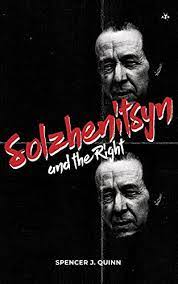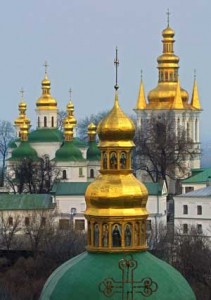Legitimate Controversy Over the Russian-Ukrainian War
Posted By Spencer J. Quinn On In North American New Right | Comments DisabledIn times of great stress, allies must focus on what binds them together. Allies will remain allies if what binds them together is more important than what could break them apart. If allies can agree on what these things are, then all else can be dismissed as mere distractions or treated as issues of legitimate controversy. If allies cannot agree on what these things are, then they cease to be allies. For the Dissident Right to continue on its path to political relevance, it would therefore be best for it to codify such in-group/out-group distinctions now that we have entered a time of stress with regards to the Russian invasion of Ukraine.
So what do all Dissident Rightists have in common regarding recent events in Ukraine? Certainly not the fervent desire to keep Western boots off the ground. I know such a statement will raise a few eyebrows, so let me rephrase the question: What do all Dissident Rightists and only Dissident Rightists have in common regarding recent events in Ukraine? When put like this, eschewing a hot war between Russia and the West is not the correct answer. People Left, Right, and center also don’t want a hot war. For me to say, “Not one drop of American blood should be shed to save Ukraine” will hardly distinguish me from many of my political enemies on the Left, to say nothing of the millions of normies on the mainstream Right. So, clearly, such a mantra — while certainly correct — will do little to prevent infighting within the Dissident Right. The same could be said about not wanting the conflict to escalate into a third world war, or (God help us) a nuclear one. These concerns go beyond the political and, while perfectly valid, are irrelevant to the question of what binds the Dissident Right together.
A better answer points to our racial identity as white Westerners. Remember the old joke about the Lone Ranger and Tonto, when they found themselves surrounded by hostile Indians? The Lone Ranger says, “Tonto, we are surrounded by hostile Indians!” to which Tonto replies, “Whatchyoo mean ‘we,’ white man?”
Western political elites, who are in thrall to non-whites, are telling white Westerners that we are being surrounded by hordes of hostile Russians. The appropriate response should be, “Whatchyoo mean ‘we’?” Anything else would countenance feeding more white bodies into the meat grinder of an already hot white-on-white war. Contributing to this war in any way is basically a lose-lose proposition for whites everywhere. Recent history alone should demonstrate that there is no “we.” How could there be when the same people who are rattling sabers with onanistic fury are the ones who stole the 2020 election, put the January 6 protestors in gulags, support anti-white Critical Race Theory, encourage non-white mass immigration, and look the other way when Black Lives Matter and antifa set fire to cities? Is there any reason at all to have truck with such people?
This reduces the controversy over Russia’s invasion of Ukraine, from a Dissident Right perspective, to the following questions: Was the invasion justified because it aims to save white Eastern Europe from the pernicious influence of a degenerate, anti-white West? Or was the invasion unjustified because it hinders Ukrainian ethnonationalism through internecine white-on-white warfare? Or, to put it a different way, do you see the war as necessary for white interests, and thus best kept limited and brief? Or do you see the war as harmful to white interests and therefore not necessary at all?
This is what I call legitimate controversy. A person could answer yes to any of these questions and still be part of the Dissident Right. We should not punish such differences of opinion with nastiness or ad hominems. Dissidents should not tear each other up over this as long as the dissidents in question are working for the greater good of whites and the civilizations we have created.
As for my take on all this, I have to be very careful, because there is so much I don’t know and events are moving very quickly. What I can offer, however, is a way of thinking about the conflict that has been tested by history and may prove useful.
 [2]
[2]You can buy Spencer J. Quinn’s Solzhenitsyn & the Right here [3].
During the Russian Civil War, which took place between 1917 and 1922, essentially three sides were at odds with each other: Ukrainian nationalists, Russian nationalists, and Soviet internationalists. Of course, it’s not as simple as that, but it’s fairly accurate as far as basic rundowns go. The Ukrainians and Russians saw the Soviets as globalist conquerors; the Ukrainians saw the Russians as imperialist oppressors; the Russians saw the Ukrainians as separatist terrorists; and the Soviets saw both the Russians and Ukrainians as anti-Semitic nativists. It should be no surprise that the Russian Civil War had a death count in the millions.
Fast-forward one century, and you have similar forces at work today, with NATO replacing the Red Army as the internationalist wing of the conflict. Another major difference is that Ukrainian nationalists, as exemplified by the Right-wing Svoboda Party, have expressed interest in joining NATO. In the past decade they’ve also worked to some degree within the NATO-approved Ukrainian government. Since all this is taking place in Russia’s sphere of influence, it makes sense that the globalists and the Ukrainians view Russian imperialism (or nationalism, depending on whom you talk to) as the greater threat.
It should be noted that many Ukrainian nationalists, such as Stepan Bandera, did cooperate with the Germans during the Second World War (and after the Holodomor, who could blame them?). These are the people many Ukrainian nationalists lionize today. So when Vladimir Putin mentions “de-Nazifying” Ukraine, I believe this is what he’s talking about. Still, having had their nationalism effectively squashed throughout the twentieth century and co-opted by globalists in the twenty-first, it’s impossible not to empathize with the plight of Ukrainian nationalists.
On the other hand, given the anti-Russian nature of many Ukrainian nationalists as well as that of NATO itself, Putin has a point when insisting that the entry of Ukraine into NATO threatens Russian security. Most of eastern Ukraine is populated by ethnic Russians, so he is right to be concerned about them as well. But on the other other hand, Putin has suppressed ethnonationalists in his own country, so who knows whose interests he really represents?
The situation is basically a mess. But from a Dissident Right perspective, it seems that the only people here with legitimate interests are the Ukrainian nationalists and the Russians who wish to thwart the encroachment of globalism and which is, ultimately, anti-white. It’s tragic that two such noble goals have to meet head-on like this, but dissidents should not excommunicate each other while arguing over which goal is nobler. They both serve the interests of whites in one way or another, and thus the topic of the Russian-Ukrainian War should be able to encompass a wide range of opinions.
Prior to the invasion, I would have stood against war. But now that it has happened, the best scenario we can hope for, aside from a low death count and a speedy conclusion, would be for the Ukrainian nationalists to work with the Russians to expel NATO while splitting the country in two à la Czechoslovakia. That way, the Ukrainians can get their ethnostate, the Russians can get their security, and the globalists can go to hell.
* * *
Counter-Currents has extended special privileges to those who donate $120 or more per year.
- First, donor comments will appear immediately instead of waiting in a moderation queue. (People who abuse this privilege will lose it.)
- Second, donors will have immediate access to all Counter-Currents posts. Non-donors will find that one post a day, five posts a week will be behind a “paywall” and will be available to the general public after 30 days.
To get full access to all content behind the paywall, sign up here:
Paywall Gift Subscriptions
 [4]If you are already behind the paywall and want to share the benefits, Counter-Currents also offers paywall gift subscriptions. We need just five things from you:
[4]If you are already behind the paywall and want to share the benefits, Counter-Currents also offers paywall gift subscriptions. We need just five things from you:
- your payment
- the recipient’s name
- the recipient’s email address
- your name
- your email address
To register, just fill out this form and we will walk you through the payment and registration process. There are a number of different payment options.
